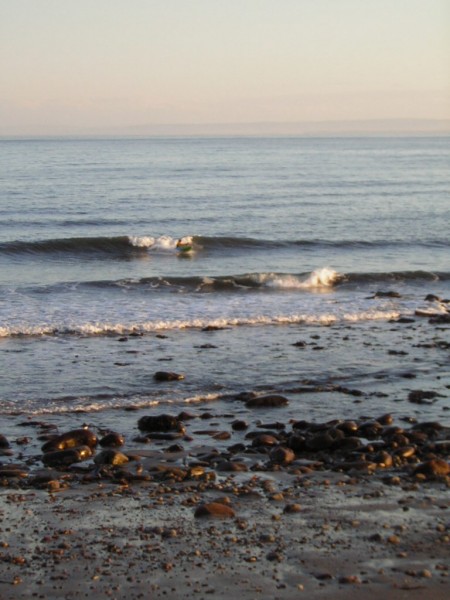An Ataireachd Àrd
Deireadh-seachdain na Càisge bha mi is mo mhàthair, mar as àbhaist, air cuairt sa chàr do àiteachan snoga eadar-dhealaichte. ’S ann a-staigh san tìr air cùlaibh Buin Ilidh a bha sinn aon latha, gu ’Baile an Òir’ aig Cill Donnain. ’S e àite brèagha samhach a th’ ann an-diugh, ged a bhiodh e air a bhith na bu thrainge aig àirde de ‘fhiabhras òir’.
Ach chan eil a-mhàin air sgàth an òir a tha Srathan Chill Donnain ainmeil. Thachair cuid de na Fuadaichean as miosa an sin, mar a tha an carragh-cuimhne ann am Bun Ilidh a’ comharrachadh. Agus ‘s ann mu an deidhinn a bha mi a’ smaoineachadh nuair a chuala mi an t-òran ‘An Ataireachd Àrd’ anns a’ chàr beagan às dèidh sin, le tuiteamas.
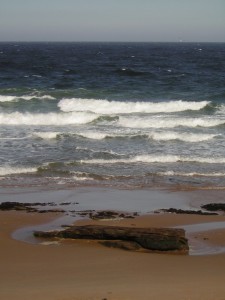 Bidh tòrr dhaoine a’ smaoineachadh gur e òran-mara a th’ ann, air sgàth an tiotail agus iomraidhean bitheanta na mara anns na rann a chluinnear as trice. Ach gu fìor ‘s e òran mu nam Fuadaichean agus eilthireachd a th’ ann, agus mar a tha am bàrd na aonar anns an àite a-nis, is na càirdean uile sgapte thall thairis, am measg coilltean dorcha Canada an Iar, fada air falbh bho chladach gràdhaichte garbh na Gàidhealtachd.
Bidh tòrr dhaoine a’ smaoineachadh gur e òran-mara a th’ ann, air sgàth an tiotail agus iomraidhean bitheanta na mara anns na rann a chluinnear as trice. Ach gu fìor ‘s e òran mu nam Fuadaichean agus eilthireachd a th’ ann, agus mar a tha am bàrd na aonar anns an àite a-nis, is na càirdean uile sgapte thall thairis, am measg coilltean dorcha Canada an Iar, fada air falbh bho chladach gràdhaichte garbh na Gàidhealtachd.
Tha a’ chiad rann ag innse dhuinn mu laithean òige ri taobh a’ chuain chumhachdaich:
An ataireachd bhuan,
Cluinn fuaim na h-ataireachd àrd,
Tha torunn a’ chuain,
Mar chualas leam-s’ e ’n am phàisd
Ach anns an darna rann tha na sgeirean-tonna, is iad a’ briseadh is a’ cùlachadh cho luath, a’ toirt gu cuimhne na daoine nach eil beò tuilleadh:
Mar chaochail an sluagh,
Bha uair ’s a bhaile-sa tàmh
agus tha an treas rann a’ dèiligeadh ri eilthireachd neo-shaor-thoileach na muinntire, agus mar a tha esan ga sealladh:
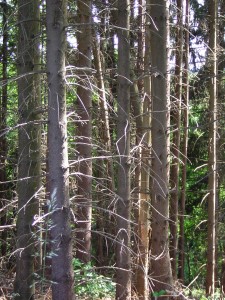 ’S na coilltean a siar
’S na coilltean a siar
Cha’n iarrainn fuireach gu brath,
Bha m’inntinn ’s mo mhiann,
A riamh air lagan a bhàigh
Ach iadsan bha fial
An gniomh, an caidreamh, ’s an àgh,
Air sgapadh gun dion
Mar thriallas ealtainn roimh nàmh.
‘S ann gu math iomraiteach, ach tiamhaidh a dh’aindeoin sin, a th’ ann an dealbh nan gleann falamh a tha e a’ peantadh anns a’ cheithreamh rann:
Seileach is luachair,
Cluaran, muran ’is stàrr,
Air tachdadh nam fuaran
’N dh’fhuair mi iomadh deoch-phàit’.
Na tobhtaichean fuar
Le bualan, ’s cuiseag gu’m bàrr,
’S an eanntagach ruadh,
Fàs suas ’s à chagailt ’bha blàth.
Tha na trì rann a leanas a’ toirt tuairisgeul air muinntir cùirteil agus coimhearsneachd laidir a dhachaigh, “uasal, modhail ‘n an càil”, air an cur às le “fir sgiursaidh an t-sluaigh” – coimeas eatarra gu fìor eadar-dhealaichte bhon fhear a dhèanadh na h-uachdarain mar leisgeul, b’ e sin gur e muinntir bhorb, leisg a bh’ anns na Gàidheil.
Anns an ochdamh rann, fear mu dheireadh, tha e a’ cur aghaidh air an dàn aige fhèin – basachadh na aonar, gun càil ach a chuimhne a-mhàin. A mhiann mu dheireadh:
Mo leabaidh dèan suas
Ri fuaim na h-ataireachd àrd.
Agus ‘s e sin miann a bhios muinntir à Machair Rois a’ tuigsinn glè mhath.
***
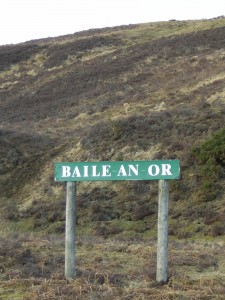 At Easter weekend my mother and I, as usual, went out for runs in the car to various nice places, and one day we ended up inland from Helmsdale, at the ‘Town of Gold’, Kildonan. It’s a lovely, quiet place today, although it would have been much busier at the height of the ‘gold rush’. But it’s not just because of the gold that the Straths of Kildonan are famous – some of the worst of the Clearances happened here, as the memorial in Helmsdale testifies. And that was what I was reminded of when shortly afterwards I heard the song ‘An Ataireachd Àrd’ by chance in the car.
At Easter weekend my mother and I, as usual, went out for runs in the car to various nice places, and one day we ended up inland from Helmsdale, at the ‘Town of Gold’, Kildonan. It’s a lovely, quiet place today, although it would have been much busier at the height of the ‘gold rush’. But it’s not just because of the gold that the Straths of Kildonan are famous – some of the worst of the Clearances happened here, as the memorial in Helmsdale testifies. And that was what I was reminded of when shortly afterwards I heard the song ‘An Ataireachd Àrd’ by chance in the car.
A lot of people think that it’s a sea song, because of the title (‘The High Surging Sea’) and the frequent mention of the sea in the best-known verses, but in fact it’s a song about the Clearances and emigration, and how the writer is now alone, his kinfolk scattered, far from the rugged coast of their beloved Highlands, among the dark woods of Western Canada.
The first verse tells us about his childhood days by the powerful ocean:
The everlasting surge,
Hear the sound of the high surging;
The thundering of the ocean,
That I heard as a child,
But in the second one the rapid breaking and retreating of the waves recalls to his mind those no longer alive:
Like the people passed on
Who once lived in this place.
and the third verse deals with his own view of that life in exile:
In the western forests
I would not want to live forever;
My mind and my desire
Was always on the cove of the bay,
But those friends
Generous in fellowship and joy
Have been scattered, defenceless,
Gone like the flocks from their foes.
The picture that he paints of the empty glens in the fourth verse is a well-known one, but very poignantly expressed:
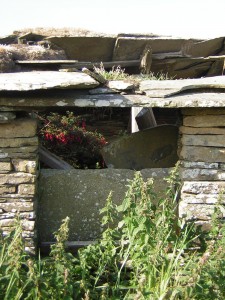 Willow and rushes,
Willow and rushes,
Thistles, marram and weeds
Choking the wells
Where I oft-times slaked my thirst.
The ruins, now cold,
With groundsel and reeds to their rafters,
And red nettles
Growing up from their hearths that once were warm.
The following three verses describe the courteous people and strong community of his old home, ‘noble and civil in their ways’, driven out by ‘the scourge of the people’;
a comparison of the two sides very different from the one usually made by the evicting landlords as an excuse, namely, that the Highlanders were a savage, lazy people.
In the eighth verse, the last one, he faces his own fate – to die alone with nothing but his memories. His last wish:
Make my bed,
By the sound of the surging sea.
And that’s a wish the Seaboard people can well understand.
***************************************************************************
You can find the complete lyrics in Gaelic and English here:
http://www3.sympatico.ca/donaldmacdonald/songs.htm#run
or in Anne Lorne Gillies’s book Songs of Gaelic Scotland, where there is full background to the song and the history of the time and place (Lewis) where Donald MacIver (Dòmhnall Iain Ruadh) wrote it over 100 years ago in the face of harrowing depopulation.The beautiful and well-known tune was composed by John MacDonald, Oban.
It’s been recorded by countless singers, notably in more recent years by Ishbel MacAskill, Cathy-Ann MacPhee, Capercaillie and Donnie Munro with Runrig.
Here’s a lovely recording by the late, much-missed Ishbel MacAskill: http://www.youtube.com/watch?v=s2-rV7AIZOo
And there is a recording of me reading the Gaelic article here, at about 41 mins 45 secs in, in the podcast of the ‘Ar Saoghal Againne’ section of Rèidio Guth nan Gàidheil, 14.03.15: http://gng.acgamerica.org/2015/03/14/asa3/
